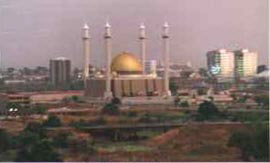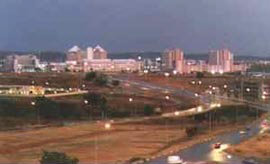 Upgrading infrastructure Upgrading infrastructure
Driving people back to the rural areas for farming activities and encouraging investors in the mineral sector is a key policy in the diversification efforts of the government. That however goes beyond just providing incentives. Nigeria has been quite ambitious in its infrastructural development too. Over 11 thousand kilometers of roads spanning the length and breadth of Nigerian cities and rural areas are wearing new look. The country's interventionist agency the Petroleum (Special) Trust Fund, PTF, has committed nearly US$1 billion to rehabilitation works on roads.
However, it should be noted that PTF is an aberration. And that is the way the new president also sees it. He had given enough indication even before he was elected that the agency would have to go. He considers its existence as an admission of inefficiency of public service whose responsibility it is to provide and maintain public facilities and infrastructure.
What Obasanjo will do to strengthen the public service to be able to cope with the vacuum PTF's exit might create is still to be seen, but he is fully aware of the irresponsive and decaying nature of the country's civil service institutions. The rail system that has been in comatose for over a decade is back on track, better, faster and more efficient than before. Following the collapse of the rail system in the mid eighties, which led to an upsurge in the use of trailers on Nigerian highways as substitute for train and the resultant incessant accidents leading to several deaths, the federal government in 1995 signed an agreement for the rehabilitation of the railway with the Chinese Civil Engineering Construction Corporation for the sum of $528.69m.
The contract details include the supply of 50 locomotives, 150 coaches, 400 wagons and
20 rail cars, rehabilitation of tracks and training of about 600 railway staff.

In addition, rail lines such as Ajaokuta-Warri-Aladja as well as Onne to Portharcourt are going on. Others in the pipeline are Lagos - Abuja rail link, this is going to be high speed train service that make 300 Kilometers in an hour. There is also Minna-Abuja rail link, Kaduna - Abuja link, and the East - West rail link.
In anticipation of an upsurge in the demand for telecommunication services, Nigeria Telecommunications Limited , NITEL, has introduced Biznet for bulk data and compugraphic information for oil, minerals and banking sectors. Every sector now has access to the service. Couple with this is the direct dialing facility which extends to every part of the world.
Other services provided by NITEL include telex, telegraph, facsimile, Voice Telecast, IMMARSAT, High Speed Data Transmission, Network Television Transmission and leased circuits. The company which has enjoyed the monopoly of the nation's communication system for years, has now been slated for privatization. Presently it has about 15,900 staff strength, an authorized share capital of US$500m, and it is 100 percent state owned. Meanwhile, in accordance with the provisions of the privatization decree, 40 percent shares would be opened for strategic investors at the international market, while 20 percent would be traded on the floor of the Nigerian Stock Exchange . Professor Buba Bajoga, the Managing Director and Chief Executive of NITEL has prepared enough ground for the privatization.
The dissolved Bureau of Public Enterprises had approved Solomon Smith Barney and Citibank to handle the privatization of NITEL. It is also learnt that the shares of M-tel (the mobile service provider) have been removed from NITEL, While the
20 per cent equity reserved for Nigerian investors would be held down to allow the strategic investors settle down to add value to NITEL.
Minerals and farm products can now be moved from different part of the country to areas of need and industrialists are assured of easy and cost effective movement of goods using the nation's 3,500 inland waterways which is one of the longest in the world. "The first aspect of the development is ... to be utilized for transportation you have to make it navigable. So, they looked at the issue related to dredging the waterways. In fact that is the first investment the government is trying to make. And then they looked at the other social aspect, that is the one the local communities will benefit from, that is, moving persons, goods and services," reveals Engineer Oteri Abubakar, M.D. Nigerian Inland Waterways Authority (NIWA) . Dredging the waterways has tremendous advantages for the country. It has the tendencies to improve ecological conditions with stable water depth of 2.5 million intended. This can result in improved fishing. It can also improve transportation and commerce through creation of new businesses and it is expected to boost inter-state shipping and commerce.
|
However, as good as the project is, it is not likely to be realized so soon. Aside form the fact that the project takes time to complete, the controversy it has attracted, except it is well handled is capable of stalling the project. A suit, by Ijaw National Congress is hanging on the project at the Benin Federal High Court, Benin by Ijaw National Congress to stop the dredging of the waterways. The Congress wonders why such massive dredging is being done without an environmental impact assessment.
Notwithstanding, the Petroleum(Special) Trust Fund, PTF, the financier of the project is committing about US$86 million to the upgrading and repairs of the vessels. Engineer Oteri Abubakar, the Managing Director of the Inland Waterways Authority (NIWA) believes the waterways can be self-financing. "We have been given a grace period of four years
.We are now working on that grace period. After four years we are on our own. So we have a strategy of survival, which we feel we are comfortable with, and we can survive after the grace period of four years", he assures.
Former Minister of Transport, Festus B.I. Porbeni rightly assesses the role of transportation.
"Transportation, even in its genetic form plays a lot of role with its nine parastatals: Nigerian Ports Authority,
(NPA), Nigeria Shippers' Council (NSC), Nigerian Railway Corporation (NRC), the Maritime Academy (for development of personnel), the Nigerian Institute of Transport Technology and we have the Inland Waterways ... so, those are the areas that play a lot of roles. Like I said, railway transportation is first, Inland Waterways (next) for heavy duty transportation, through the land to the seaports for all the import-export activities".
Nigeria is doing a lot in the transportation sector, but it wouldn't bend backward to satisfy investors only for them to fall short of expected international trade standards. And these include vessels that navigate Nigeria's waterways. "We have an outfit that ensures that all vessels that leave and come into the country are properly equipped with necessary safety and communication equipment, boilers ... we also have these process controllers still undergoing training ... the training continues to ensure that the administration of safety meets the international standards. We are not just asking the world to recognize us because we are a developing country, we want to be just as good, we go all out to see that this standard is met," explains Mr. J.PO. Egese, Director-General, National Maritime Authority(NMA).

As part of modernization efforts of the Nigerian government, five of Nigerian ports: Apapa, Tin Can Island, Pina, Roro, and Portharcourt are undergoing a comprehensive computerization which would link the ports to the headquarters of the Nigerian Ports Authority, (NPA), in Abuja, the country's capital city. With these efforts, ports bill processing that takes between eight to 12 months would now take only two days. "Oh, yeah!... our accounting system will be settled properly and then the businessman there , the main ship owner, this is what he is looking for: You send in your ship, you come, you settle your account, you know, immediately, you conclude all this, another journey, you settle, so there is improvement on both sides. For the ship owner there is reduction in expenses," explains Engineer Wail Ahmed, MD, Nigerian Ports Authority, NPA.
Ahmed's high profile is definitely rubbing off on the port operations in Nigeria. He is most likely the longest serving Port MD. in the West African sub- region. This has allowed for the stability of the Nigerian port operations. To him, experience remains the best teacher, so, staff are sent abroad to see how ports are operated. " I sent some of my workers, like some of them travel to Europe, sponsored by the NPA, to Liverpool, Hamburg(Germany) where they saw how containers are charged, in Antwerp in Belgium they saw what was happening in Netherlands too. Me, I know what is happening but, if you stay here in Nigeria without going round to see what is happening, you will not know. And when they returned I sent them to West African ports like in Cote D'Ivoire, Ghana, Senegal, Benin in order for them to see what is also happening in Africa...," explains Ahmed.
As part of ports reform, the Federal Government announced at the beginning of this year the introduction of destination inspection. The new policy replaces the pre-shipment inspection system which was believed to be cumbersome. Already, the new system is yielding positive results. There is now an upsurge in cargo traffic at Lagos ports to the extent that the available space has proved incapable of coping with the cargoes. |

